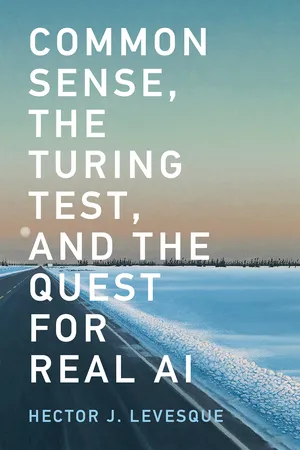
- English
- ePUB (mobile friendly)
- Available on iOS & Android
Common Sense, the Turing Test, and the Quest for Real AI
About this book
What can artificial intelligence teach us about the mind? If AI's underlying concept is that thinking is a computational process, then how can computation illuminate thinking? It's a timely question. AI is all the rage, and the buzziest AI buzz surrounds adaptive machine learning: computer systems that learn intelligent behavior from massive amounts of data. This is what powers a driverless car, for example. In this book, Hector Levesque shifts the conversation to "good old fashioned artificial intelligence," which is based not on heaps of data but on understanding commonsense intelligence. This kind of artificial intelligence is equipped to handle situations that depart from previous patterns—as we do in real life, when, for example, we encounter a washed-out bridge or when the barista informs us there's no more soy milk.
Levesque considers the role of language in learning. He argues that a computer program that passes the famous Turing Test could be a mindless zombie, and he proposes another way to test for intelligence—the Winograd Schema Test, developed by Levesque and his colleagues. "If our goal is to understand intelligent behavior, we had better understand the difference between making it and faking it," he observes. He identifies a possible mechanism behind common sense and the capacity to call on background knowledge: the ability to represent objects of thought symbolically. As AI migrates more and more into everyday life, we should worry if systems without common sense are making decisions where common sense is needed.
Frequently asked questions
- Essential is ideal for learners and professionals who enjoy exploring a wide range of subjects. Access the Essential Library with 800,000+ trusted titles and best-sellers across business, personal growth, and the humanities. Includes unlimited reading time and Standard Read Aloud voice.
- Complete: Perfect for advanced learners and researchers needing full, unrestricted access. Unlock 1.4M+ books across hundreds of subjects, including academic and specialized titles. The Complete Plan also includes advanced features like Premium Read Aloud and Research Assistant.
Please note we cannot support devices running on iOS 13 and Android 7 or earlier. Learn more about using the app.
Information
Table of contents
- Cover
- Title page
- Copyright page
- Dedication
- Table of Contents
- Preface
- Acknowledgments
- 1 What Kind of AI?
- 2 The Big Puzzle
- 3 Knowledge and Behavior
- 4 Making It and Faking It
- 5 Learning with and without Experience
- 6 Book Smarts and Street Smarts
- 7 The Long Tail and the Limits to Training
- 8 Symbols and Symbol Processing
- 9 Knowledge-Based Systems
- 10 AI Technology
- End Notes
- References
- Index